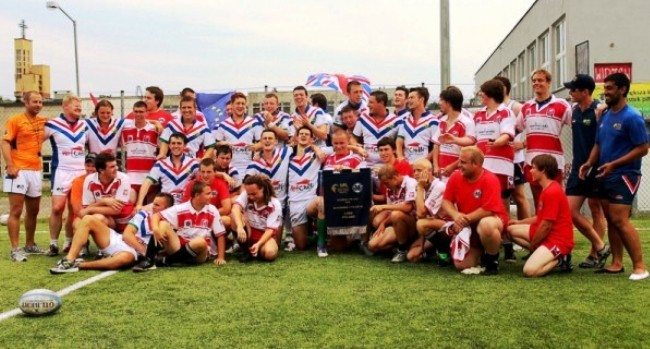
By Jonathan Fowler, AFP
LODZ, Poland, July 10, 2012 (AFP) - Squinting in the baking sun on a pitch tucked among high-rise blocks, the wiry teenager hooks onto a pass and powers forward, until he's stopped in his tracks by a wall of bodies. Welcome to the new frontier of rugby league, which has stepped up a drive to expand beyond its heartlands of Australasia, northern England and the south of France.
The Lodz Magpies - to date Poland's only club - have made history with Poland's first ever matches, facing the Pioneers, British and Irish student players who are missionaries for the sport. Despite crushing 98-0, 82-0 and 158-0 defeats, they are unbowed.
"What counted was fun and experience, so we left the pitch with our heads held high," said Lukasz Lucka, their 23-year-old mastermind. The Magpies, founded last year in this central Polish city, are made up of players aged 16 to 20 who had never picked up a rugby ball until they started training last year.
"They've put some good passes together. This is totally new for them. And it's all about development," said Pioneers' captain Liam Duffy. Local kids are also learning about the new sport. "When we first show them a rugby ball, some of them think it's an American football," joked tour manager Steve Curtis. "We try to teach them some skills, and basically introduce them to the game."
The Magpies are a shoestring operation, wearing donated kits and playing on a football pitch using bolt-on uprights to form rugby posts.Traditional rival rugby union has been around in Poland since the French brought it here in the 1920s, albeit with ups and downs. While that 15-player code draws only a few thousand in the nation of 38.2 million, it's enough for three national amateur divisions and a Poland team in Europe's third tier.
But Poland is uncharted territory for the 13-player league code. Rugby league grew out of an 1890s schism in England over payments to working class players, evolving into a different game from the traditionally amateur union game, which officially turned professional only in 1995. In a fitting nod to those roots, the Magpies' home is Lodz's gritty Widzew district. With Widzew home to an eponymous football club, it's also a matter of breaking the mould.
"We were looking for something a bit different, to work with tough, problem lads. It's a bit of an accident. I went on the Internet to find out about rugby. I found a rugby league match and was hooked," explained Lucka. "It's great for lads like this. There's plenty of running and tackling, it's really intense, needing quick thinking."
The cyber-hunt also led Lucka to Daniel Andruczyk, a US-based Australian physicist with Polish roots, and dedicated proponent of the game. "All the credit needs to go to Lukasz, as finally we have someone with the passion to get things going," Andruczyk told AFP. "I do my best to help Lukasz and the lads out with equipment and playing gear as well as travelling out to do some training sessions."
The Magpies play in a black and white strip donated by Australia's Tweed Head Seagulls. Andruczyk also put Lucka in touch with the British-based Rugby League European Federation (RLEF), leading to a meeting of minds. "This is the RLEF's raison d'etre. If the sport is going to prosper it must grow on the continent and elsewhere," said Danny Kazandjian, its general manager.
The Pioneers' Curtis, meanwhile, said the aim is to help develop two or three tiers of European rugby league, creating domestic competitions to feed national teams. Founded in 2005, the Pioneers have toured the likes of the Czech Republic, Estonia, Latvia, Norway and Ukraine, which do not have a rugby tradition.
"It's about grassroots development," said team manager Keith Sandhu. "We're not just coming here for it to be a flash in the pan. We're looking long-term."
Magpies winger Adam Adamczewski, 17, was gung-ho. "I played football on and off for five years. This is completely different," he said. "There's no national team, yet. I don't know if I'd make it, but of course I'd love to be in it!"
That may be more than a pipedream. Three clubs are enough to form a national federation which can join the RLEF. "We're starting from zero. But the outlook's good," said Lucka.
